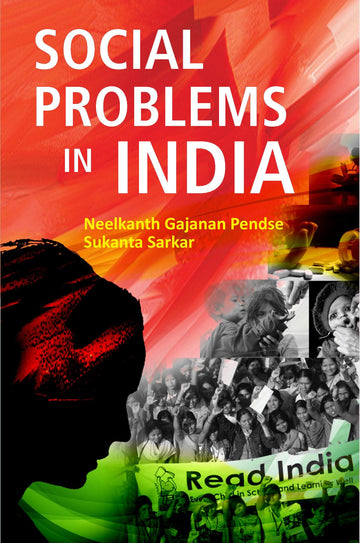Social Problems in India
Regular price
₹ 837
Sale price
₹ 837
Regular price
₹ 900
Unit price
Save 7%
| Item Weight | 400 Grams |
| ISBN | 978-9351281061 |
| Author | Sukanta Sarkar |
| Language | English |
| Publisher | Kalpaz Publications |
| Pages | 324 p |
| Book Type | Hardbound |
| Dimensions | 25 X 15 X 5 |
| Publishing year | 2015 |
| Edition | 1st |
| Return Policy | 5 days Return and Exchange |

Social Problems in India
Product description
Shipping & Return
Offers & Coupons
About The Book: - Human society is a group of people involved in persistent interpersonal relationships, or a large social grouping sharing the same geographical or social territory. More broadly, a society may be illustrated as an economic, social, or industrial infrastructure, made up of a varied collection of individuals. Members of a society may be from different ethnic groups. Society, in general, addresses the fact that an individual has rather limited means as an autonomous unit. Human societies are most often organized according to their primary means of subsistence. Societies may also be structured politically. Societies are social groups that differ according to subsistence strategies, the ways that humans use technology to provide needs for them. The main form of food production in such societies is the daily collection of wild plants and the hunting of wild animals. Hunter-gatherers move around constantly in search of food. Fruits and vegetables grown in garden plots that have been cleared from the jungle or forest provide the main source of food in a horticultural society. Agrarian societies use agricultural technological advances to cultivate crops over a large area. As access to electronic information resources increased at the beginning of the 21st century, special attention was extended from the information society to the knowledge society. People of many nations united by common political and cultural traditions, beliefs, or values are sometimes also said to form a society. It is hoped that the present edition of this book will be beneficial to all concerned of the society in general and students, lawyers, advocates, academicians, human rights institutions, researchers and NGOs working in sociology field, in particular. Contents of this book are Child Marriage, Bonded Labour, Child Labour, Widow, Farmer Suicide, AIDS, Urbanization, Arm Trafficking, Poverty, Violence against Women, Human Trafficking , Orphan Children, Caste system, Beggary, Urban slum, Migration, Terrorism, Unemployment, Corruption, Drug Abuse, and Superstition. About The Author:- Neelkanth Gajanan Pendse (MA, PhD) is former Head of the Department of Post Graduate Studies and Research in Economics, and Presently Chairman Board of Studies in Economics, Rani Durgavati University, Jabalpur (M. P.). He specialises in Econometrics and Development Economics. He has published more than 100 research papers in professionally reputed Journals. He has six books to his credit and four books are in pipeline. He is also member of Editorial Board of Departmental Journal “Katilya Varta”. He is expert member to several academic bodies and life member of IEA, ISAE, ISLE, ICA, MPEA and IIOA. He is the first economist in the state of Madhya Pradesh to win young scientist Award in Social Sciences awarded by MAPCOST, Bhopal. Sukanta Sarkar (MA, PhD) is working as Assistant Professor, Faculty of Management Studies, ICF AI University , Agartala (Tripura). He did bachelor and master degree in economics from Tripura University. He awarded doctorate degree for his work on rubber tappers. He qualified UGC – NET Exam in December/2006. He presented many research papers in various seminars, conferences and symposiums. He has published various research papers in foreign and national journals. He has authored books relating to Parallel economics, Human trafficking , Orphan children, Rubber plantation , Corporate social responsibility, Handicraft workers, Deforestation, Environmental pollution , Agrarian economics, Tourism, Autonomous District Council, Agricultural economics, Economic development, Sustainable development, Urbanization, Microfinance, and Social security . CONTENTS:- Preface 9 Abbreviations 11 1. Child Marriage 13 [Introduction; What is Child Marriage? Reasons Behind; Global Perspectives; Child Marriage in India; The Effects; Legal Mechanism; Child Marriage Restraint Act, 1929; Prohibition of Child Marriage Act, 2006; Conclusion; References] 2. Bonded Labour 26 [Introduction; Who are Bonded Labourers? Reasons Behind; Global Perspectives; The System in India; Effects of Systems; Legal Mechanism; Bonded Labour System (Abolition) 1976; International Labour Organisation; Conclusion; References] 3. Child Labour 44 [Introduction; Who is Child Labourer? Reasons Behind; Global Perspectives; Indian Scene; Effects of Child Labour; International Labour Organisation (ILO); Effective Measures; The Convention and Its Implications; Legal Mechanism; National Child Labour Project; Conclusion; References] 4. Widows 63 [Introduction; Who are widows? Widows in India; Challenges before widow; Abolition of Sati;Widow Remarriage; Legal Perspectives; Hindu Widows’ Remarriage Act, 1856; Maintenance and Welfare of Parents and Senior Citizens Act, 2007; Conclusion; References] 5. Farmers’ Suicide 71 [Introduction; Reasons of Farmers’ Suicide; Farmers; Suicide in India; Effects of Suicide; Government Assistance; Conclusion; References] 6. AIDS 85 [Introduction; What is AIDS/HIV? Reasons of AIDS; AIDS: Global Perspectives; AIDS in India; Effects of AIDS; Preventive Measures; Assistance to Victims; National AIDS Control Organisation; Conclusion; Reference] 7. Urbanisation 103 [Introduction; What is Urban Area? Global perspectives; Urbanisation in India; Problems of Urbanisation; Government Policies/Programmes; Housing and Urban Development Corporation Limited; Urban Slum; Rural-Urban Migration; United Nations Human Settlement Programme; Conclusion; Reference] 8. Arms Trafficking 122 [Introduction; What is Arms Trafficking? Reasons of Arms Trafficking; Global Perspectives; Arms Trafficking in West Africa; Arms Trafficking in India; Arms Trafficking and Terrorism; Effects of Arms Trafficking; Controlling Arms Trafficking; Conclusion; References] 9. Poverty in India 139 [Introduction; Urban Poverty; Rural Poverty; Human Poverty Index; Measurement; Types of Poverty- Income Poverty and Non-Income Poverty; Absolute Poverty and Relative Poverty, Indian Experience; Causes of Poverty; Inequality, Growth and Income Poverty; Effective Measures in Poverty Alleviation; Conclusion; References] 10.Violence against Women 152 [Introduction; Rape: Marital Rape; Honour Killing; Acid Throwing; Bride Burning; Dating Abuse; Domestic Violence; Female Genital Mutilation; Femicide; Foot Binding; Forced Abortion; Forced Pregnancy; Human Trafficking; Bride Purchasing; Murder of Pregnant Women; Forced Prostitution; Genocidal Rape; Pregnancy from Rape; Sexual Violence; Violence against Prostitutes; Sati; Sexual Slavery; Conclusion; References] 11. Human Trafficking 170 [Introduction; Global Perspectives; Human Trafficking in India; Causes of Human Trafficking; Effects of Trafficking; Legal and Human Rights Issues; Conclusion; References] 12.Orphan Children 184 [Introduction; Orphan Children in Africa; Orphan Children in Asia; Orphan Children in Europe; Orphan Children in North America; Orphan Children in Latin America; Impact of Orphan Crisis; Legal and Human Rights Perspectives; Conclusion; References] 13. Caste System 196 [Introduction; What is Caste? The Untouchables; Caste System; Historical Review; Caste System in India; Effects of Caste System; Caste System and Social Reformers; Government Initiatives; Human Rights Violations against Dalits in India, Conclusion; References] 14. Beggary 208 [Introduction; Who are Beggars? Reasons of Beggary; Global Perspectives; Beggary in India; Legal Mechanism; Conclusion; References] 15. Urban Slums 218 [Introduction; What is Slum? Reasons of Slum; Global Perspectives; Slum Areas in India; Effects of Slum; Rural-Urban Migration; Conclusion; References] 16. Migration 228 [Introduction; What is Migration? Reasons of Migration; Global Perspectives; Migration in South Asia; Migration: Africa to Europe; Migration in India; Rural-Urban Migration; Effects of Migration; Remedial Measures; Conclusion; References] 17. Terrorism 242 [Introduction; Types of Terrorism; Internet and Terrorism; Global Perspectives; Terrorism in India; Terrorism in Jammu and Kasmir; Effects of Terrorism; Conclusion; References] 18. Unemployment 256 [Introduction; What is Unemployment? Reasons of Unemployment; Types of Unemployment; Global Perspectives; Unemployment in India; Effects of Unemployment; Government Initiatives; Conclusion; References] 19. Corruption 266 [Introduction; What is Corruption? Types of Corruption; Reasons of Corruption; Global Perspectives; Corruption in India; Indian Money in Foreign Accounts; Supreme Court of India; Anti-Corruption Effort; India against Corruption; Effects of Corruption; Conclusion; References] 20. Drug Abuse 283 [Introduction; Types of Drug; Reasons of Drug Abuse; Drug Abuse and Afghanistan; Drug Abuse and South-East Asia; Drug Abuse and Latin America; Drug Abuse in India; Effects of Drug Abuse; Government Initiatives; Conclusion; References] 21. Superstition 296 [Introduction; What is Superstition? Reasons of Superstition; Superstition in India; Good Luck Superstitions; Bad Luck Superstitions; Effects of Superstition; Science and Superstition; Conclusion; References] Bibliography 304 Index 317 The Title 'Social Problems in India written/authored/edited by Sukanta Sarkar', published in the year 2015. The ISBN 9789351281061 is assigned to the Hardcover version of this title. This book has total of pp. 324 (Pages). The publisher of this title is Kalpaz Publications. This Book is in English. The subject of this book is Social Science. Size of the book is 14.34 x 22.59 cms Vol:-
- Sabr– Your order is usually dispatched within 24 hours of placing the order.
- Raftaar– We offer express delivery, typically arriving in 2-5 days. Please keep your phone reachable.
- Sukoon– Easy returns and replacements within 5 days.
- Dastoor– COD and shipping charges may apply to certain items.
Use code FIRSTORDER to get 5% off your first order.
You can also Earn up to 10% Cashback with POP Coins and redeem it in your future orders.








